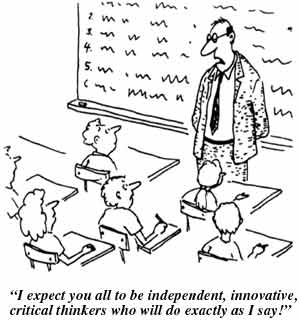
As a high school teacher I see just as many errors as the elementary school teachers. Spelling words correctly is, in my opinion, a lost art. I am just as guilty of it as the students are at times. I am amazed on a daily basis how many common words that are used often in our dialogue are often misspelled. Through time, we as a society have relied on word processors (i.e. spell check) more often than the good old dictionary. However, some of the tips in the video were definitely helpful for all teachers that stress spelling words correctly or teachers that still use spelling tests.
Why we spell check...Tip #4 stuck out in my mind as a helpful tip/tool that all teachers can and should use. Tip #4 explains that teachers should present words in chunks. For example, the word together should be shown to the students as to-get-her. This may help some students that find it difficult to remember the entire spelling of a word. Remember, this may not work for all words.
One tip that I have used in the high school setting is simply spelling the words on the board that I know students will have a difficult time spelling before my lecture. That way, I will not have to stop the lecture to spell a word such as Dien Bien Phu or Ho Chi Minh.
As far as penalizing students for misspelled words, I have not enforced point deductions on in-class essays since student teaching. I have noticed that students are better served seeing the misspelled word circled on their essay rather then having points deducted for every word or every five misspelled words. For essays that are completed at home, points will be deducted because students need to be held accountable for checking over their work before turning in final drafts. These are some of my suggestions/comments, but I am looking forward to what everyone else does in their classes. I guess I better spell check this to make sure I have not made any mistakes. Take care.

.jpg)
3 comments:
Hi Mark!
At the high school level I would think that spelling should count in any final work that is handed in. Students have lots of resources to use in checking their spelling before submitting papers. During the process of writing it can be overlooked, but in its final stage it should be accurate and correct. Literacy, including spelling, should be thought of as a cross content area that applies to all subjects. If it is not reinforced at the high school level, it loses its value. Students need to be diligent in their work habits. Guiding them and encouraging them to perform at their best is essential to good ethics and will carry over into their adult life. We need to create proficiency in all areas of literacy and through all subject areas. If the tatooist had teachers who insisted on accuracy of spelling, maybe the error would not have occurred. He/she should be advised to use a dictionary from this point on. What if a poor speller is in the medical profession and gave you the wrong medication in your IV during an emercency? This could prove to be a fatal mistake. Accurate spelling can be vital to your performance in the work force. I would insist on accuracy. I do, at the elementary level, in my music classes. I think it is an important skill that should be required of our students. If they don't know how to spell a word, at least have them look it up or create their own dictionary of words that give them trouble, as mentioned in the video. Thanks for sharing. The picture caught my eye and tweeked my feathers!
Marianne,
I wish I could enforce deductions for spelling errors on tests, quizzes, and homework, but I am unable to do so. I assign homework about once or twice a week (I emphasize that students study for quizzes rather than spend time on homework assignments). If I am lucky, I will receive about 60% of the homework assignments the next day when they are due. The majority of students do not complete homework these days. The students that do complete the homework have misspellings everywhere. I am more concerned with how students structure their answers as well as whether or not the answers are correct compared to spelling errors.
Another problem that I am faced with are students that have not mastered the English language. Many of my students are not proficient in English, to the point where they use translators in class. I also have students with IEPs that spell every other word in their answer phonetically. Even though it does not say in their IEP that spelling errors cannot be deducted points...should I do it anyway? If I do not do it for that student, then what do I tell the student sitting next to them who is getting points deducted? I guess this is just one of the joys of teaching.
Trust me, I wish students had the ability to improve their spelling, but to many teachers, it's not one of my/our major concerns. Thanks for the great comment on my blog....I really appreciate it. Take care.
You stated, "Spelling words correctly is, in my opinion, a lost art."
I agree. Yet, it is still an issue and what will happen when the youth of America really believes that before is b4?
As usual, thanks for the insightful posting!
Post a Comment